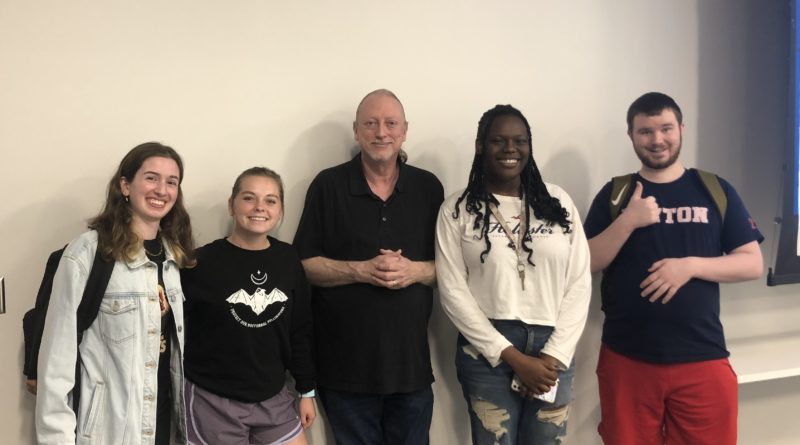OPINION: Why writers should go to workshops of genres they may never write. Here’s my experience at a horror writer’s workshop
From left to right: Mary Feller, Tori Miller, Tim Waggoner, Kadija Toure, Devin Horn. Photo taken by Meredith Doench.
Tori Miller | News Editor
First and foremost, I am a gigantic chicken when it comes to anything overly scary, gory or unsettling. Anything with too much blood, guts, and spiders you will see me dead on the floor. These kinds of over-the-top antics and shock factor elements are indicative and essential to the horror genre, or are they?
In honor of the spooky season, I recently went to a horror writer’s workshop which genuinely surprised me with how thoughtful and nuanced horror is as a genre. Setting aside being chased by Jason with a chainsaw, horror is one of the novel genres that goes under appreciated for the writing elements it brings to the table. While I am not the biggest fan of horror movies, horror books are something that I can get behind since I have control over what the scary features look like in my own brain.
On October 25, three of my classmates and I attended a horror writer’s workshop hosted by Woodbourne Library located in Centerville. As part of our English 483 Novel Writing class, we are required to attend at least one writing workshop to add into our participation grade. The four of us listened to acclaimed horror enthusiast and novelist Tim Waggoner– who has over 50 novel publications, seven published short stories, and currently teaches creative writing at Sinclair Community College in downtown Dayton.
Diving into the world of demons, vampires and other mythical creatures, I never thought I would enjoy learning about horror as much as I did. Typically, my writing stays in the contemporary and light fantasy realm, so seeing how elements of other styles populates in horror was fascinating. Waggoner kept me engaged the entire time with his vibrant use of examples and humorous powerpoint slides. Within the context of horror, the most interesting part were the factors that differentiated horror movies from horror novels.
Everyone always associates horror with bad blood special effects and characters experiencing terrible physical levels of pain. However, contrary to popular belief, horror is more based on the emotional and mental sides of characters. We discussed how the fear of the unknown was the major scare tactic used and that the emotional side of horror is more pertinent than describing physical pain. Horror stories are reactionary ones. They’re about how characters react to monsters or to becoming monsters, which is why writers use a close point of view to their characters because this escalates the impact of emotional reactions.
It was also interesting how horror operates when considering a character’s motivation. For example, in quest fantasies things are practically spelled out from chapter one: a group of adventurers go on a quest, do things along the way, and try to reach their goals. Whereas, in horror, an average joe is going about their mundane daily life when a catalytic event brings in the crazy horrific elements. Something I would have never known or thought about if it hadn’t been for this workshop.
New experiences can open the doors for new realizations. What I’ve concluded, as an avid creative writer, is that by attending workshops for genres outside of your typical wheelhouse you learn more about the art of writing as a whole. There are differences and similarities within genres which can be brought out when you analyze any genre in accordance to your favorite one. Authors, writers, poets, and anyone curious enough to learn more about writing should seriously consider attending writing workshops to further develop their literary toolbox.
For more opinion pieces, like Flyer News on Facebook and follow us on Twitter (@FlyerNews) and Instagram (@flyernews)

